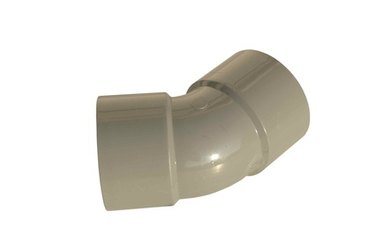Things You'll Need
Marker pen
Handsaw
Workman's knife
PVC primer
PVC coupling
PVC cement

Schedule 40 PVC pipe is the standard type of PVC sewer pipe used in homes (the other type is schedule 80, which has thicker sides). It comes in various diameters, ranging from 1-1/2 to 4 inches, and it is joined together using PVC primer, cement and a coupling that comes in a variety of angles (30, 45, 60, 90 or 180 degrees). Tee couplings are also available to join one piece of PVC pipe to another. Once the cement has dried, the joint is as strong and tough as any other part of the sewer line.
Step 1
Mark the Schedule 40 PVC pipe at the point where another piece needs to be attached to it. Cut through the pipe at the mark using a handsaw or hacksaw. For a straighter cut, use a power saw or miter saw. Make the cut straight. Scrape off any plastic fragments and burrs from the cut pipe end using a workman's knife.
Video of the Day
Step 2
Apply PVC primer around the outside of the pipe end. Prime the inside of a PVC coupling. Make sure that the coupling is the same diameter as the pipe. Wait 20 seconds while the primer dries.
Step 3
Apply PVC cement (glue) to one inside end of the coupling, as well as the pipe end. Quickly push the cemented end of the coupling onto the pipe end. Hold in place for 20 seconds to allow the cement to dry.
Step 4
Measure and cut a second piece of PVC pipe to the required length. Remove any burrs. Apply PVC primer around one outside end. Wait 20 seconds for it to dry.
Step 5
Apply PVC cement to the remaining inside end of the coupling and around the primed end of the second piece of pipe. Quickly push the cemented pipe end into the coupling and hold in place for 20 seconds.
Tip
PVC cement takes only a few seconds to dry, so apply it to the primed pipe and couplings only when you ready to connect the joint together.
Warning
Wear eye goggles when sawing through PVC pipe.
Video of the Day